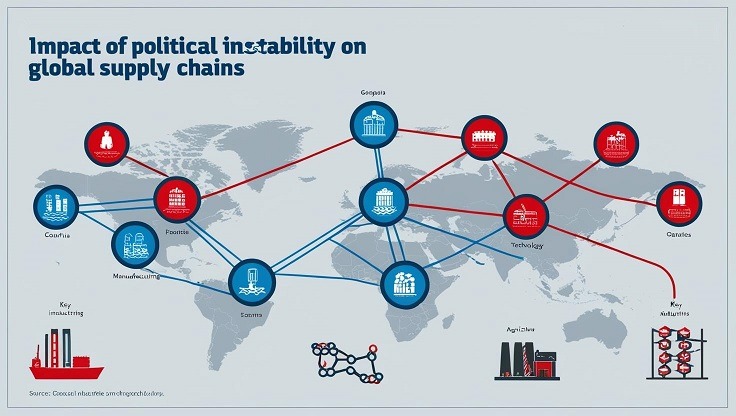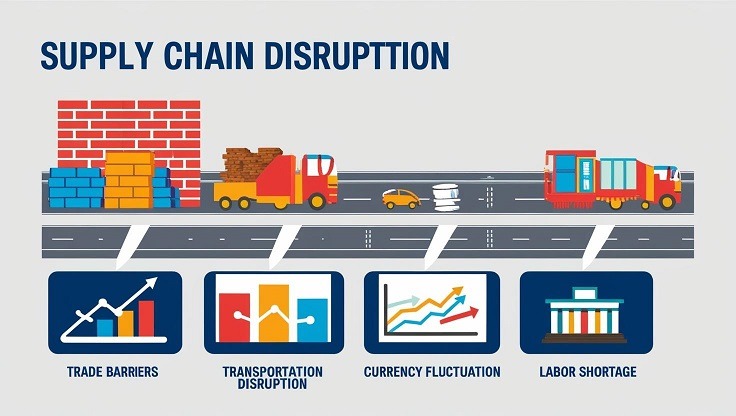
Political Instability and Its Impact on Global Supply Chains
Global supply chains are the backbone of modern commerce, enabling businesses to source raw materials and products from around the world. However, when political upheavals, regulatory changes, or geopolitical tensions arise, distribution chains can face significant disruptions, affecting both sourcing and delivery for distributors. In a previous article we reviewed the relationship between politics and distribution. In this article, I explore the key ways political instability impacts global supply chains and offer insights for distributors on mitigating these risks.
How Political Instability Disrupts Supply Chains
Trade Barriers and Tariffs: Political changes often result in new trade policies, tariffs, and import/export restrictions. For example, the U.S.-China trade war led to increased tariffs on various goods, forcing distributors to seek alternative suppliers, which increased costs and caused disruptions.
Regulatory Uncertainty: Regulatory changes, such as sanctions or customs regulations, create compliance challenges for distributors. Brexit is a prime example, where new customs requirements between the UK and EU led to delays, increased paperwork, and higher operational costs.

Transportation and Logistics Disruptions: Political instability can disrupt transportation networks, impacting the movement of goods. Conflict zones, lihe the Russia-Ukraine war, have affected key shipping routes, increasing delivery times and transportation costs. Ports and border closures further exacerbate these disruptions.
Currency Fluctuations: Political uncertainty often leads to currency volatility, affecting the cost of goods and international transactions. For distributors, fluctuating exchange rates can increase procurement costs and reduce profit margins.
Labor Shortages and Workforce Disruptions: Political unrest can lead to labor strikes, workforce displacement, and disruptions in production facilities. For example, protests and labor strikes in countries like France and Chile have halted manufacturing and delayed shipments, impacting downstream distributors.
Mitigating the Impact of Political Instability
To minimize the impact of instability, distributors should adopt proactive risk management strategies, including:
Supplier Diversification: Reducing reliance on suppliers from politically volatile regions ensures continuity of supply. Building relationships with suppliers in different regions can provide alternatives during disruptions.
Scenario Planning and Risk Assessment: Conducting regular risk assessments and developing contingency plans helps distributors respond quickly to disruptions. Scenario planning allows businesses to prepare for different outcomes, minimizing operational disruptions.
Technology and Innovation: Investing in technology and innovative solutions can enhance supply chain visibility and agility. Real-time tracking, data analytics, and automation can help distributors respond quickly to disruptions.
Flexible Logistics Networks: Building flexible transportation and logistics networks allows distributors to reroute shipments and adapt to changing conditions. Partnering with multiple carriers and exploring alternative shipping routes ensures resilience.
Compliance and Regulatory Expertise: It is crucial to stay informed about international trade regulations and compliance requirements. Working with customs brokers and legal experts helps navigate complex regulatory landscapes, reducing the risk of delays and fines.
Building Strategic Inventory Reserves: Maintaining strategic inventory reserves of critical products can help mitigate the impact of supply chain disruptions. By holding buffer stock, distributors can continue to meet customer demand during periods of instability.
Conclusion
Political instability poses a significant threat to global supply chains, impacting distributor product sourcing, manufacturing, and delivery. While these risks cannot be eliminated, distributors can take proactive measures to mitigate their impact. By diversifying sourcing, monitoring political developments, developing contingency plans, and leveraging technology, distributors can build more resilient supply chains that can withstand the challenges of a volatile world. LaceUp’s solutions provide a robust platform for distribution companies to seamlessly integrate different systems, allowing you to monitor logistics costs closely. If you want to learn more about LaceUp’s solutions, give us your information to schedule a meeting.
I hope this article on political instability and supply chains has been helpful to you. I will continue to post information related to warehouse management, distribution practices and trends, and the economy in general. Our channel has a lot of relevant information. Check out this video of the effect of inflation in your profit.


Sorry, the comment form is closed at this time.